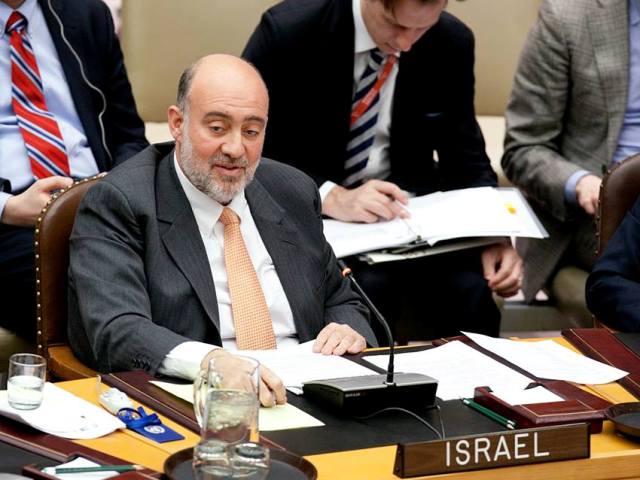Amb Prosor to UNSC on protection of journalists
-
Protection of Civilians in Armed Conflict
-
7/17/2013
GovXShortDescription
Journalism is the public loudspeaker for the brave men and women who have taken to the streets demanding to be heard. Yet in much of the Middle East, their voices and their stories are being stifled.
-
-

 Amb Ron Prosor addresses UN Security Council
Copyright: UN Photo/Devra Berkowitz
Amb Ron Prosor addresses UN Security Council
Copyright: UN Photo/Devra Berkowitz
|
GovXContentSection
Thank you, Madam President, for convening this debate and bringing awareness and attention to this important subject.
So far this year, 26 journalists have been killed and 175 have been imprisoned for trying to do their job. Instead of telling the story, journalists are increasingly becoming the story. We must be united in our condemnation of those who seek to silence the press and hide the truth.
Madam President,
As we speak, the Middle East is in flames. From the Straits of Gibraltar to the Straits of Hormuz, people are crying out for democratic reforms and freedoms.
The façade of the so-called Arab Spring has fallen away. In its place, there remains the repression, chaos and confusion that have long defined the region. Attacks on the media are increasing all over the world, but nowhere is it more dangerous to be a journalist than in the Middle East.
Madam President,
Every day people all over the globe turn on televisions, open newspapers and browse the Internet to follow events unfolding in the Middle East. This information comes to us from the brave men and women who put their lives on the line to document the bloody insurgencies and revolutions erupting throughout the region.
Not only do journalists have to contend with censorship, intimidation and abduction, they are now becoming the deliberate targets of violence. From Baghdad to Damascus and from Tehran to Khartoum, journalists are being beaten, raped, tortured and killed.
Madam President,
Journalism is the public loudspeaker for the brave men and women who have taken to the streets demanding to be heard. Yet in much of the Middle East, their voices and their stories are being stifled.
By restricting these voices, the Arab states are restricting their ability to develop their societies and improve the lives of their citizens. The scrutiny that goes hand-in-hand with an independent media is essential to holding government accountable to its citizens. Every voice must have the chance to be heard – especially the voices of dissent and marginalized members of society.
Madam President,
In Israel, freedom of the press is woven into the very fabric of our democratic society. We have no shortage of media outlets that report on every facet of society and very often, demand better of our government and our leaders.
Our commitment to the free exchange of ideas has made Israel a destination of choice for many reporters. Journalists in Israel don’t have to fear the arbitrary arrests, imprisonments and executions common in the totalitarian states that make up the rest of our region.
The very liberties that Israel provides are both a blessing and a curse. While we are immensely proud of our democratic institutions, they often result in the burden of condemnation falling on Israel.
After all, foreign journalists would much sooner face news cameras in Tel Aviv than bullets in Damascus or torture in Tehran. Some reporters choose to focus their scrutiny on the Middle East’s only real democracy. Rather than risking their safety, these journalists flock to Israel knowing there will be few repercussions and quite possibly a Pulitzer Prize for their efforts.
Despite all the challenges that go hand-in-hand with an independent media, there is no doubt in my mind that the benefits outweigh the costs. As Thomas Jefferson said, “Our liberty depends on the freedom of the press. It cannot be limited without being lost.”
Freedom, democracy and tolerance are a heavy burden – and Israel is proud to carry them. With more reporters and human-rights activists per capita than anywhere else on the planet, Israel understands that a society cannot truly be free until its citizens have the right to ask questions, challenge the status quo, and openly speak their minds.
Madam President,
Democracy with all its drawbacks is worth far more than any dehumanizing and destructive dictatorship. Attacks against journalists are not simply attacks on individuals; they are attacks on freedom - on freedom of speech, freedom of expression and freedom of the press. Those who try to silence journalists are in fact trying to silence the voices of millions of people whose stories deserve to be told.
Thank you, Madam President.
-
-
-
-
-
-
-
-
-
-
-
-
-
-
-
-
-
-
-